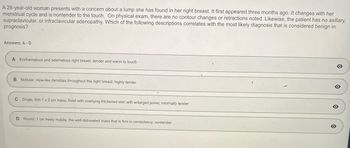Question

Transcribed Image Text:A 28-year-old woman presents with a concern about a lump she has found in her right breast. It first appeared three months ago. It changes with her
menstrual cycle and is nontender to the touch. On physical exam, there are no contour changes or retractions noted. Likewise, the patient has no axillary,
supraclavicular, or infraclavicular adenopathy. Which of the following descriptions correlates with the most likely diagnosis, that is considered benign in
prognosis?
Answers: A-D
A Erythematous and edematous right breast, tender and warm to touch
B Nodular, rope-like densities throughout the right breast; highly tender
C Single, firm 1 x 2 cm mass, fixed with overlying thickened skin with enlarged pores; minimally tender
D Round, 1 cm freely mobile, the well-delineated mass that is firm in consistency: nontender
Expert Solution
This question has been solved!
Explore an expertly crafted, step-by-step solution for a thorough understanding of key concepts.
This is a popular solution
Trending nowThis is a popular solution!
Step by stepSolved in 3 steps

Knowledge Booster
Similar questions
- Your 30-year old patient reports having several recent experiences of unprotected sex and reports genital itching and discharge. What condition(s) might you suspect? What are risk factors for this condition? What further assessment should be performed? What patient education would you provide if your suspected diagnosis is confirmed?arrow_forwardDonald is a 62-year-old male who has been experiencing frequent urination and has had trouble starting to urinate for several weeks. He has a family history of benign prostatic hyperplasia. Donald’s BMI is 29; he occasionally drinks alcohol and coffee; and his diet consists mainly of red meat, starches, and dairy products. Just yesterday, he had an episode of incontinence and decided to seek care immediately. Donald was referred to a urologist who suspected that his prostate was the cause of his urinary issues. Donald is experiencing urinary symptoms, but prostate conditions can also interfere with the male reproductive system. Which of the following statements is true? Donald should be worried about developing erectile dysfunction, as it is a common side effect of prostate enlargement. Prostate enlargement can impair a male’s ability to produce sperm. Some forms of prostate enlargement, such as prostate cancer, can occlude the ejaculatory duct and…arrow_forwardKelly is a 36-year-old female who has a history of type 2 diabetes, several respiratory infections as a child, and two full-term pregnancies (5 and 7 years ago). Two days ago, she began feeling a burning sensation when urinating. Her pain is progressively getting worse. Kelly assumes that she has a urinary tract infection (UTI) and makes an appointment at her primary clinic to seek relief.Kelly will likely be prescribed short-course antibiotics for treatment. She may also be prescribed an analgesic. How would this help her, physiologically?arrow_forward
- Write the term the phrase describes. 1. Attaches the heart to the body cavity 2. Covers the surface of the lungs 3. Covers the surface of abdominal organs 4. The lubricating liquid in serous cavities 5. Circle the organs that are found within the peritoneal cavity: pancreas, liver, kidney, spleen, adrenal glands, abdominal aorta, inferior portions of vena cava, stomacharrow_forwardA 48 year old female is admitted with the diagnosis of pancreatitis. She is complaining of nausea, vomiting and severe muscle weakness. The electrocardiogram shows frequent premature ventricular contractions. Her symptoms are most likely due toarrow_forwardA 52-year-old female with cirrhosis has returned for an urgent follow-up visit concerning new weight gain and swelling in her abdomen. Which of the following physical exam techniques is most helpful in identifying ascites? Answers: A - D A Palpation for suprapubic masses on supine patient B Percussion from the area of distal tympany to the area of dullness on a suspine patient C Inspection for jaundice and striae D Percussion from the area of central tympany to the area of dullness on a supine patient O Oarrow_forward
- History of present illness: Patient is a 28 year old Caucasian female presenting to an outpatient clinic with complaints of weakness, numbness, tingling, and mild tremors (for the last 2 weeks) in her upper extremities, having trouble concentrating, fatigue, dizziness, and lacking balance for at least three and half months. Past medical history Breast fibroadenoma Mononucleosis Family history: Father has HBP Mother has Rheumatoid arthritis Social History No tobacco, illicit drugs, or alcohol history Patient has 2 children and lived with husband in Alaska for most of her adult life. Currently having trouble with home choirs and playing with children. Allergies None Medications Multivitamins Key Labs, images, or procedures performed in relation to current diagnosis. CBC: Hemoglobin: 10.8g/dL MRI with contrast: Inflammatory demyelination within the central nervous system. Currently inconclusive. Lumbar puncture (spinal tap): Elevated levels of IgG antibodies, and…arrow_forwardDonald is a 62-year-old male who has been experiencing frequent urination and has had trouble starting to urinate for several weeks. He has a family history of benign prostatic hyperplasia. Donald’s BMI is 29; he occasionally drinks alcohol and coffee; and his diet consists mainly of red meat, starches, and dairy products. Just yesterday, he had an episode of incontinence and decided to seek care immediately. Donald was referred to a urologist who suspected that his prostate was the cause of his urinary issues. Donald’s urologist performs a digital rectal exam and finds the surface of the prostate to be hard and many nodules are present. Based on these findings, which of the following is most likely? BPH Prostate cancer UTI Kidney stonesarrow_forward
arrow_back_ios
arrow_forward_ios